‘Realistically, repatriation is not possible at this time’
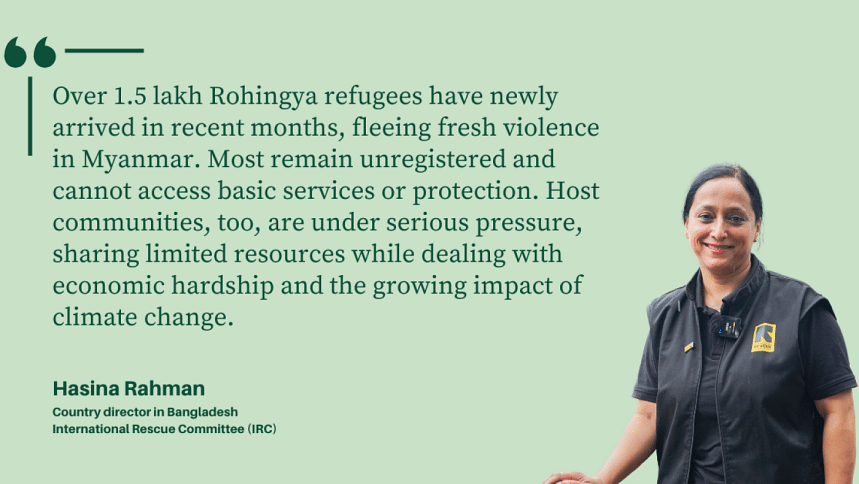
Hasina Rahman, International Rescue Committee's (IRC) country director in Bangladesh, discusses the ongoing crises at Rohingya refugee camps, fund cuts and Bangladesh's role in preserving their dignity and facilitating repatriation in a conversation with Tamanna Khan of The Daily Star.
What is IRC's scope of work in Bangladesh?
Before we get into what the International Rescue Committee (IRC) is doing in Bangladesh, here is a quick overview of who we are.
The IRC was founded in 1933 at the call of Albert Einstein to help people fleeing conflict and persecution. Today, we work in over 40 countries, responding to some of the world's toughest crises. Whether conflict, disaster, or displacement, our mission is to help people survive, recover, and rebuild—with a strong focus on women and girls, who are often the hardest hit.
In Bangladesh, our story goes back to the 1971 Liberation War, when we supported Bangladeshi refugees in India with health and education programmes. We relaunched our country programme in 2017 in response to the Rohingya refugee crisis. Since then, we have been active across all Rohingya camps and in host communities in Cox's Bazar and southern districts like Satkhira, Khulna, Barishal, Barguna, and Patuakhali.
Our work is locally led and designed to meet the full range of needs in crisis-affected communities. We provide health care, including reproductive health, education for children and youth, protection services for women and children, and support for people to develop skills that help them earn a living again. We also help communities prepare for future disasters, which are becoming more frequent due to climate change.
Everything we do is grounded in humanitarian principles and delivered in partnership with Bangladeshi NGOs and community-based groups. Our priority is to reach those most at risk: women, girls, children, persons with disabilities, and the elderly.
Since 2017, we have reached over 18 lakh people in Bangladesh with essential services that restore dignity, safety, and hope.
What's the situation right now in the Rohingya camps? Do they have what they need?
Right now, over a million Rohingya refugees are living in what has become the world's largest and most crowded refugee settlement in Cox's Bazar. Conditions are getting tougher by the day, especially for women and children, who make up more than half the population.
The biggest challenge? Funding. The 2025 Joint Response Plan has appealed for over $930 million, but so far, below 20 percent of that has been received. That means the response is under enormous pressure, and humanitarian groups can focus only on the most life-saving services. Things like protection, education, and skills development are being pushed aside, not because they are not essential, but because there simply is not enough funding.
With the monsoon being active in full swing, the situation is even more difficult. Flooding and landslides are already affecting camps and surrounding host communities. Many shelters are not strong enough to withstand the weather, and basic infrastructure is fragile. Learning centres are shutting down due to a lack of funds, leaving nearly half a million children without access to education. Older youth have no formal education, no training, and no jobs, leaving them vulnerable to risky or harmful alternatives.
We are also seeing more dangerous trends. Desperate for safety, many refugees are turning to unsafe boat journeys, and tragically, some are losing their lives at sea. Women and girls face growing risks of gender-based violence, even while doing everyday things like collecting water or using toilets. Camp security is deteriorating, and there are alarming reports of forced recruitment by armed groups.
Mental health is another major concern. Many people are dealing with trauma, anxiety, and distress, but with limited funding, access to psychosocial support has become extremely difficult.
And on top of all this, over 1.5 lakh Rohingya refugees have newly arrived in recent months, fleeing fresh violence in Myanmar. Most remain unregistered and cannot access basic services or protection. Host communities, too, are under serious pressure, sharing limited resources while dealing with economic hardship and the growing impact of climate change.
In short, the situation is critical. Without immediate and sustained international support, we risk a total collapse of the humanitarian response, putting the lives and dignity of both Rohingya refugees and their Bangladeshi hosts at greater risk.
How are funds cut by donors impacting IRC's overall work? Would this fund cut push more Rohingya towards illegal activities and joining insurgent groups?
The funding cuts have been incredibly tough. Like many organisations, the IRC has had to make some difficult choices about what we can and cannot continue. We are still delivering life-saving services, like health care, protection, and emergency support. However, critical programmes for longer-term wellbeing, like those on mental health, education, and skill-building, have taken a hit.
And when young people, especially adolescents, do not have access to learning or ways to earn a living, risks grow. We see more early marriages, child labour, and dangerous boat journeys driven by desperation, not choice.
There is no direct evidence linking funding cuts to people joining insurgent groups, but it is fair to say that the longer refugees live in limbo, without education, jobs, or even freedom of movement, the more hopeless and frustrated they will feel. That kind of frustration can lead to instability, not just in the camps, but in surrounding communities and regions too.
That said, it is important to recognise the strength and resilience of the Rohingya community. Most continue to live peacefully despite difficult conditions. But to reduce risks and support their dignity, we need to invest in comprehensive services, especially those that support youth and women. And for that, we need reliable, long-term funding.
What steps can the Bangladesh government take to ensure that the Rohingya at least have the basic minimum welfare?
First, it is important to acknowledge just how much the government and people of Bangladesh have already done. Hosting over a million refugees for nearly eight years is no small task, and the generosity of communities in Cox's Bazar is truly commendable.
That being said, as the crisis becomes more prolonged, we have to think about how to move beyond just survival and look toward dignity and stability. That starts with ensuring that the refugees have continued access to basic services such as health care, shelter, education, and skill development, and that they can live safely and with some predictability.
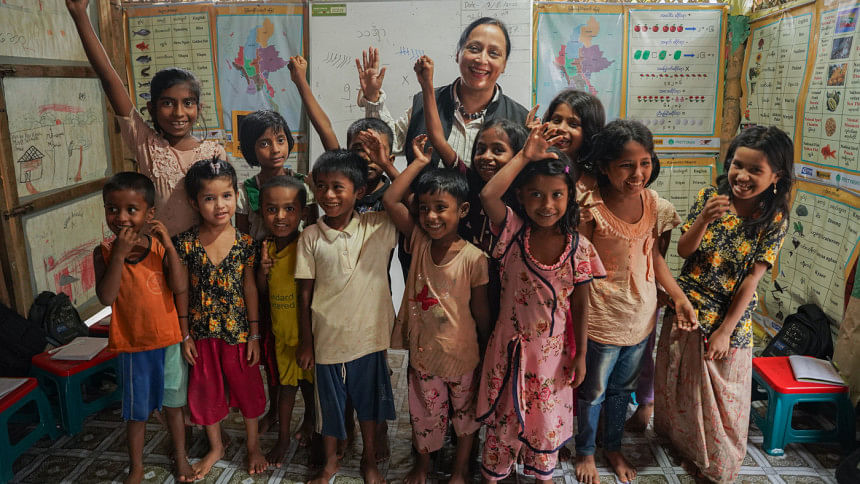
One key area is participation. The Rohingya refugees must have a voice in the decisions that shape their daily lives and futures. Whether it is services, safety, or potential repatriation, their perspectives on these matter. Supporting mechanisms that allow them to speak up—especially women, youth, and other marginalised groups—is critical. The Government of Bangladesh can play a leading role here by enabling safe and structured ways for Rohingya voices to be included in policy and programme decisions. Not only is it the right thing to do, but it also helps build trust and strengthens future solutions.
Women and children, in particular, need more protection and access to justice, especially when they face violence. Creating safer environments, including better lighting, secure facilities, and clear pathways for reporting abuse, makes a big difference.
There is also a real need to expand opportunities—formal education for children, skills training for the youth, and income-generating options for adults. And safe, regulated freedom of movement would go a long way in helping people access these services and contribute more meaningfully to their communities.
Finally, none of this can happen in isolation. Continued engagement with international and regional partners—ASEAN, the UN, and donor countries—is key to keeping momentum and resources going. Long-term solutions will take time, but right now, we can focus on ensuring dignity, inclusion, and hope for the Rohingya people.
During the UN secretary general's visit this year, he mentioned the safe repatriation of Rohingya refugees. What is its possibility in your view? What can Bangladesh do to expedite safe Rohingya repatriation?
The UN secretary-general's call for safe and voluntary repatriation was an important reminder that return is the ultimate goal, but it has to be the right kind of return. Right now, conditions in Myanmar are simply not safe. Violence in Rakhine State continues, and there are major political, security, and humanitarian issues. So realistically, repatriation is not possible at this time.
That is where Bangladesh's role becomes vital. Continued diplomatic and international engagement with regional partners and platforms like ASEAN, the UN, donor countries, and even Myanmar needs to be pushed for the kind of changes that would make a return possible.
Meanwhile, Bangladesh can use its voice on global platforms to advocate for ongoing humanitarian support and push for complementary pathways, like third-country resettlement for the most at-risk refugees. These efforts are part of a broader, shared responsibility to ensure that Rohingya refugees do not remain stuck in limbo forever.
The upcoming UN high-level conference on the Rohingya in New York on September 30, 2025, is a critical opportunity to keep global attention on the crisis. We hope the conference will lead to renewed political commitment, increased funding for the humanitarian response, and a stronger push for complementary pathways, including safe, voluntary, and dignified return when conditions allow, and meaningful support for host communities.
With the right kind of collaboration and international pressure, we can work towards a future where a safe and dignified return is truly possible.

 For all latest news, follow The Daily Star's Google News channel.
For all latest news, follow The Daily Star's Google News channel. 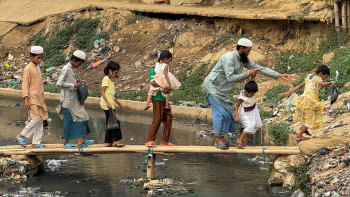
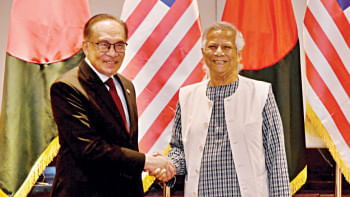
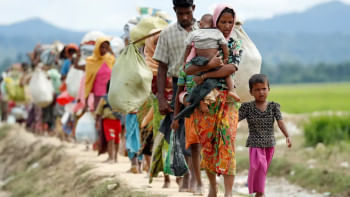


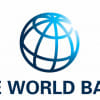
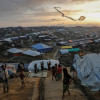
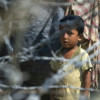




Comments